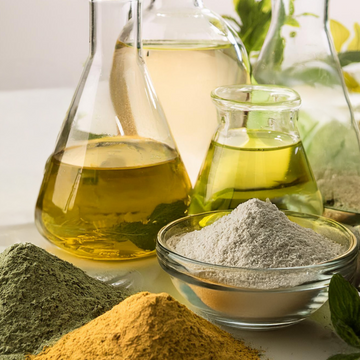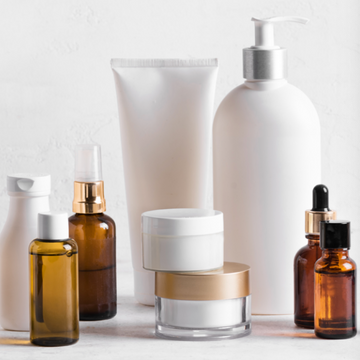
In the beauty industry, there is a mesmerizing array of high tech ingredients that each promise their own miraculous results. But amid this skincare wonderland, a growing number of women are turning back to a more natural holistic approach in skincare.
There is an unfortunate myth that suggests that natural skincare is not as high-performing or backed by science as their synthetic counterparts…but the truth is that any cosmetic ingredient, including natural or naturally derived, can be backed by science.
This misconception usually comes from companies and their aggressive marketing, emphasizing their advanced scientific formulations that make up their products.
However, many natural ingredients offer comparable, if not superior, benefits to help treat various skin concerns and conditions.
The benefits of natural ingredients in skincare products are abundant and undeniable. Nature has been providing us with solutions in both the personal care and medical fields for thousands of years.
For safety standards, our natural skincare ingredients are formulated and tested with the same rigor as most synthetics. We’re also always researching and sourcing the most effective and bioavailable ingredients that NEVER sacrifice health for results.
We never want anyone to compromise their health standards when it comes to having a results-driven beauty routine.
Read on to learn more about natural vs. synthetic ingredients and the benefits they hold.
WHAT DO “NATURAL” AND “NATURALLY DERIVED” MEAN?
In the world of cosmetics and skincare, something is “natural” when it only uses minimally processed ingredients, like our cold-pressed oil infusions, which preserve all the active phytonutrients within our botanicals and herbs.
Naturally-derived ingredients harness the power of science to extract potent molecules from plant botanicals to create effective formulas. For example, coco glucoside is a minimally-processed form of coconut oil used as a surfactant in soaps.
Chemistry is used to modify natural ingredients to create entirely new molecular structures to increase performance.
WHAT ARE SYNTHETIC INGREDIENTS?
Synthetic ingredients are primarily derived from petrochemical and silicone sources, which go through many different procedures during manufacturing, as opposed to the minimal procedures done with natural ingredients.
Examples include parabens, sodium laureth sulfate, triclosan, petrolatum, and synthetic colors and perfumes
Now, synthetic does not always mean bad.
Labs can stabilize ingredients for consistency and uniformity in each batch. We prefer to use ingredients with well-documented efficacy and safety profiles. A few examples are hyaluronic acid, niacinamide (Vitamin B3), ceramides and L-Ascorbic Acid (Vitamin C).
WHAT ARE BIOMIMETIC INGREDIENTS?
Biomimetics is a science-backed technique that involves emulating aspects of nature to create better solutions. In the context of skincare, the term refers to synthetic ingredients or formulations that mimic our bodies' own naturally-produced compounds to deliver benefits to the skin.
Lab created peptides are created to mimic the body’s natural amino acid chains. For example our hexapeptide 11 peptide in our CREAM is a signaling peptide containing 6 amino acids (hexa=6) and is made using a fermentation biotechnology to improve collagen synthesis.*
Reading labels on the box and the website BEFORE you buy is both responsible and enlightening. As a broad stroke guide, check out the dirty dozen to avoid.
If you can’t pronounce more than half the ingredients on the back of your product, the chances are pretty high that you’re putting a lot of inactive, microplastic-ridden synthetics on and into your skin. And since your skin is your largest organ, it's important to feed it the most body-recognizable ingredients you can.
THE BENEFITS OF NATURAL INGREDIENTS
In the realm of skincare, many natural ingredients can stand toe-to-toe with synthetics in terms of efficacy.
Natural ingredients frequently offer a range of benefits beyond their primary function. Many times, they have a multifaceted efficacy that usually cannot be replicated by a single-purpose synthetic ingredient.
For example, chamomile not only helps with soothing sensitive skin, but it also has antioxidant properties that help even out skin tone and encourage cellular regeneration, and argan oil contains antioxidants, Vitamin E, and other anti-inflammatory ingredients that help to soothe sensitive skin.
Here are some more high-performance natural ingredients with effective properties in natural skincare.
PROVEN ANTI-AGING NATURAL INGREDIENTS
Avocado Oil - Avocado oil is rich in beneficial phytonutrients such as Vitamins A, B1, B12, D, and E, alongside fatty lipids which help to calm and deeply nourish skin.
Licorice Root - Licorice root contains glabridin and active compounds with skin-lightening properties to help fade hyperpigmentation and age spots.
Hyaluronic Acid - Hyaluronic acid is found in various plants and vegetables and is a humectant, meaning that it hydrates by pulling moisture out of the air and locking it into your skin.
Tea Tree Oil - Tea tree oil is renowned for its potent antimicrobial and anti-inflammatory properties. It’s been widely used for acne treatment, reducing the severity and number of acne lesions. Studies have shown this oil to be just as effective as benzoyl peroxide, a common synthetic acne treatment, but with fewer side effects such as dryness and irritation.
Aloe Vera - Aloe vera is a powerful natural ingredient known for its soothing and healing properties. It’s very effective in treating sunburns, minor cuts, and skin irritations. Along with providing moisture, the gel sourced from the aloe plant has anti-inflammatory properties that help in the healing process, making it a natural alternative to synthetic hydrocortisone creams.
Witch Hazel -Witch hazel is a natural astringent that helps to tighten skin and reduce inflammation. It’s very effective for treating oily and acne-prone skin by reducing excess oil production and soothing irritation. Read your labels as many synthetic based astringents will say ‘witch hazel’ but will be predominantly alcohol.
Green Tea Extract - Green tea is packed with antioxidants, particularly polyphenols, which provide excellent protection against environmental damage and reduce signs of aging. Its anti-inflammatory properties help to calm irritated skin, and its ability to fight free radicals makes it a natural contender against synthetic anti-aging ingredients, like retinoids and peptides.
ETHICS AND SUSTAINABILITY
Natural ingredients are often sourced using sustainable methods and are biodegradable, making them better for the environment.
Synthetic ingredients, on the other hand, can be derived from non-renewable resources and may persist in the environment for many years to come, causing long-term damage to our ecosystem.
The efficacy of natural ingredients in skincare is well supported by both scientific research and centuries of traditional medicine.
While synthetic ingredients can be effective, natural alternatives offer a highly effective and gentler more holistic approach to skincare and often with fewer side effects and added environmental and ethical benefits.
By embracing the power of nature, we can achieve healthy, radiant skin without compromising on safety or sustainability.
To learn more about our natural ingredients and what they do for your skin, click here to go to our Ingredients page. You can also Contact Us here with any questions you may have or call us at Tel: +1-727-286-7684, we’d love to hear from you!
Xoxo,
Denice









